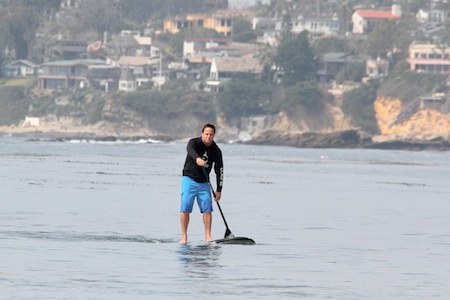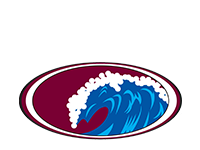A year-old ordinance regulating commercial stand-up paddleboard operators has yielded frustrations for city enforcement officials and SUP operators alike. The former complain of overtaxed lifeguards and legion code violations, while the latter claim persecution by overzealous enforcers.

The controversy surfaced when Marine Safety Chief Kevin Snow gave the City Council an update Tuesday on the success of the new law, which established a permitting system for operators in May 2014. He also outlined a staff recommendation for a uniform standard for permit revocation.
The new regulations were intended to address safety concerns and mitigate neighborhood nuisances, stemming from an explosion in unregulated SUP companies offering lessons and tours on public beaches. Not only were there concerns about classes of novice paddleboarders crowding the beaches and creating hazards for swimmers and surfers in the water, but residents also complained of the companies’ commercial vans blocking beach access and taking up parking spaces in nearby neighborhoods.
Lifeguards had to constantly clear swimmers from areas where novice SUPers were launching their 11-foot and longer boards into the surf, Snow said. Beachgoers and surfers alike feared for their safety, and a number of established SUP operators called upon the city to ban fly-by-night operators who didn’t follow safety protocols or exhibit common courtesy.
It was hoped that the permitting process would rein in scofflaw SUP operators, since those without permits could be banned and those with permits signed an agreement to abide by municipal, state and federal laws.
But Snow’s report drew a different picture. Since last fall over 300 verbal warnings and 21 citations have been issued, he said. These came from multiple departments enforcing both existing city codes and SUP regulations, including the prohibition of boards stored on the beach, obstructing public and emergency access ways, illegal parking of commercial vans and conducting commercial transactions on the beach. “It appears that commercial operators are testing for loopholes,” he said.
Snow said he had expected better compliance by now through warnings and citations. To remedy that, staff called for revoking the permits of commercial SUP operators who disobey lawful orders, commit any safety violation, or commit any three non-safety violations within a 12-month period. He also suggested the city may need to reconsider limiting hours of operation by stand-up instructors or limit the number of SUP operators. (These last items had been abandoned when the ordinance was drafted, in favor of the less restrictive permitting.)
But SUP operator Billy Fried of La Vida Laguna, who had initially been in favor of regulations for safety, said the problem wasn’t so much lack of compliance as the lifeguards and other city enforcement officials interpreting the law too narrowly.
He argued that bringing boards to the beach 10 minutes prior to meeting students is not “storing equipment” and should not be considered a code violation. He also took issue with city staff’s insistence that operators cannot ask clients to sign the liability forms on the beach, and complained about being arbitrarily cited with obstructing access when simply loading and unloading equipment from vehicles.
Snow disagreed, noting that the city code allows no commercial activity on the beach, and that includes signing liability waivers. As for storing boards on the beach, 10 boards on the sand for any amount of time restricts public access to that space, he insisted, admitting the issue “has been a bone of contention” with operators. “The goal is compliance,” he said, “we need compliance.”
A number of permitted SUP operators also complained that they were being unfairly cited or warned when they remained on the shore with students and boards for more than five minutes before launching.
Instructors need at least 15 minutes to offer safety briefings to novice students before paddling out, said Doug Oyen. He noted that he had abandoned a corporate career to join La Vida Laguna, but said enforcement this summer has “drained the joy” out of the business.
“We do feel we are under a microscope,” agreed Antony Besso of Bliss.
“We are in favor of a safety briefing,” said Snow, acquiescing on that point.
Erin O’Malley, owner of Sunset Stand Up Paddle, objected to the proposed permit revocation trigger by a single safety violation. In a collision, for example, it isn’t always obvious who is at fault, she said.
Fried added that any revocation be subject to appeal to the City Council, especially when it could be caused by one infraction, which could be subjective.
Mayor Pro Tem Steve Dicterow agreed that permit revocations should be appealable to the City Council and called for more dialogue between marine safety personnel and SUP operators to iron out differences between the letter and the spirit of the law.
Council member Rob Zur Schmiede suggested potentially suspending a permit in advance of revoking it. City Manager John Pietig said they could put time limits on the revocation period and also suggested that the permit revocation trigger of “any safety violation” be revised to address concerns of subjective revocation raised by the operators.
“We’re losing track of the bigger issue: public safety,” said Council member Toni Iseman. “We’re not here to represent the vendors; we’re here to represent the public that goes to the beach.”
At the end of the day, the Council’s ruling allows staff to initiate revocation proceedings against any SUP operators who disobey lawful orders, commit an egregious safety-related violation occurring after prior warning, or commit any three non-safety violations within a 12-month period. It also makes revocations appealable to the Council, allows instructors 15 minutes for a safety briefing on the sand with students and boards before entering the water, and calls upon marine safety to report back in October, at which time they may consider stricter regulations or limiting providers, along with other issues of contention.




